
Colin Stafford-Johnson introduces us to The Wild Gardener Episode 2 with 'I've always loved wild places, places where nature's in charge'.
Colin grew up in a different world of immaculate lawns and gardens filled with Roses and Gardening was his family's life.
His Father was Television Gardener Barney Johnson but Colin as a child he was always playing in the woods and the wild.
Colin introduces himself as a Wildlife Cameraman who has spent most of his life filming amazing places and creatures but now he is coming home.
Going back to the East Coast of Ireland he wants to turn his childhood garden into a wildlife haven.
Colin is not a Gardener but over the course of 2 years he wants to transform the abandoned acre of ground only using native plants to the area then let nature take over.
He will dig a pond, plant hedgerows, sow wildlife meadows and plant woodlands to attract as many creatures as he can to live with him in his very own Wild Garden.
Starting a Wild Meadow is not easy and Colin had thought he had covered most problems but he did not ever think they would go for 7 weeks with no rain.
The ground is so dry and if they do not get any rain soon his plans will be a disaster.
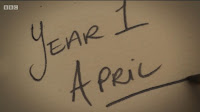
It is raining and thundering and it is such a welcome sight for Colin sat under his porch watching the rain pour down.
They had the light and warmth but were missing the moisture to make the seeds grow, now they have it surely it will start to grow.

The theme tune to The Garden plays and his Father Barney Johnson is talking about hanging baskets and Colin said his Dad could tell him all about plants and trees and how to sow seeds.
His Dad sadly died at just 50 years old after he was diagnosed with Cancer and Colin says it seemed unfair as he was always so healthy and fit.

The wild world his Dad grew up in has now all gone in just a generation and Colin thinks he would have reacted in the same way as him!
You should make your garden a refuge for the wildlife who are struggling.
Colin used to feel hopeless about the situation but now he has found his hope in creating this Wild Garden.
The garden is full of Wild Garlic which is a wonderful plant and that and the Celandines and Bluebells that take advantage of the Spring and complete their whole life cycle before the trees are in leaf.

It looks like it is covered in Bees amongst the white flowers but they are all Hover Flies who do not sting but look like bees as a defence.
This is so the birds think they are Bees who sting so they do not bother eating them, the real difference is Hover Flies only have 1 set of wings and Bees have 2.
The Garden is humming and he wants to hear that sound right up to October.
Colin has found his first nest of the year and its from a Mistie Thrush and it is the female who has built the nest herself and laid an egg a day until they are all laid then she incubates them.
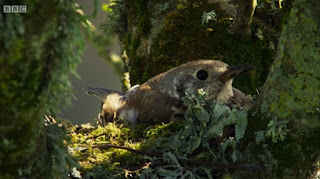
Within days the balls of fluff that are the hatched chicks start changing quickly, every few days and before long they will have fledged.
From egg to fledging only takes about 2 weeks.

May is alive, flowers are on the plants, birds are singing, there are insects and Butterflies everywhere.
The Mason Bees are gathering mud by the pond to build their homes to lay eggs in and they are a harmless Bee.
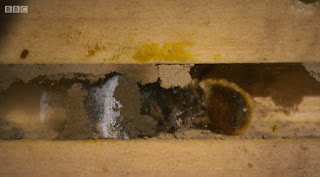
Solitary Bees are in decline and when most people think of bees it is the Honey Bee or Bumble Bee.
The majority of the Bees are in fact Solitary Bees and the relationship they have with the other bees in the Hotel is that they are all just getting on with what they need and not cooperating or defending the hive.
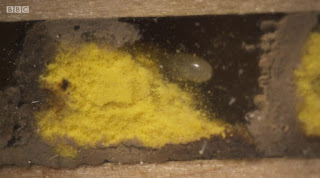
This will keep the predators away and each section is the same with a good lump of pollen for food for the larva to get it to adult size.
It stays in there all Winter and emerges next April as an adult and the cycle starts again.

Antrim Town
Mark Smyth has white-tailed Bees, Buff-Tailed, Red-tailed Bumblebees every day enmasse in his garden.
It is an oasis amongst the concrete jungle of the Town and he the only gardener in the area who has such a garden for Bees.
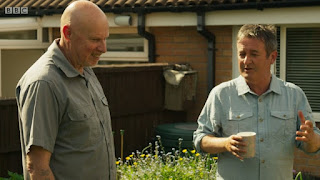
He spotted an unusual Bee 3 years ago which he caught and photographed to ask on Social Media what it was.
It was a Willoughby's Leafcutter Bee and the first recorded sighting in Northern Ireland.
This started his interest off to see how many insects he could attract to the garden and his Solitary Bee list is at 17 species!
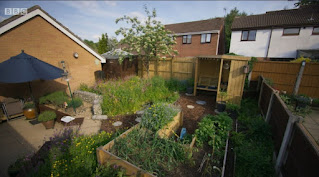
He asks if the garden has changed and Mark says its gone from non native plants that you would get from the Garden Centre to more and more native plants like Bird's-Foot Trefoil, the Greater variety and Field Scabious.
Passers-by love the garden and somebody called it Mark's Magic Garden and people ask him for advice for their own gardens.
It would be amazing if Land Owners and Local Councils set aside an area in every housing estate for a Wild Flower Meadow with native plants.
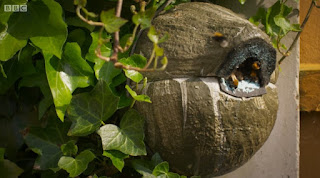
Colin says in this biodiversity crisis you would think that it would be a no-brainer to do this.
'Build it and they will come'
It not just about losses in the Amazon if you add up all the grass in Ireland and the UK, so much has been lost, we have our own crisis of lost natural areas and wildlife.
We are back to 'The Garden' with Barney Johnson and this time its spraying against Green Fly and even back then he was advising against doing it when they were in flower to protect the Bees.
Colin is by the pond as it is developing more species are turning up like the Damselfly who a week ago there were none.
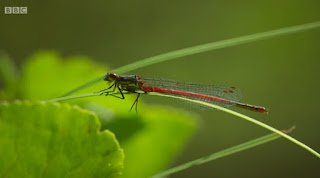
Around the pond the males lay in wait waiting for a female and then they spring into action and have little claspers to hang onto the female whilst she decides if she is going to mate with him.
When they are mating they form a heart shape and after that she starts laying her eggs just under the surface of the pond.
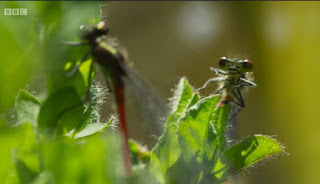
'Masters of the water and masters of the air'.

For a few weeks Colin was getting worried nothing was going to happen in the Garden so when it started to rain the change was extraordinary, from barren to flower filled Meadow.
The Phacelia has grown quickly and this non native plant is amazing for Bees you just throw the seed down on the bare soil and it grows and the insects come.
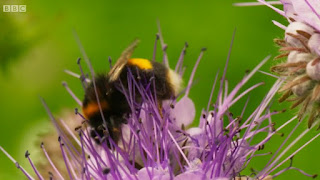
When Colin was a young boy and wandering in the wild he realised that all the things he thought were important in life were free and out there.
To spend time sitting under a tree in the woods gave him thinking time and time to figure things out.
To call him in for lunch his Mother had a Gong and she bang it nice and hard and he had to be home in 5 minutes or he would miss out on his lunch.
It was Colin's Mother who kept this little patch of land and Mammy Johnson has come to see what he has been doing with it.

'Don't fall in the pond now' laughs Colin as he leads her round the garden he is so glad she hung onto it
He points out a Devil's-bit Scabious and she wonders who gives them their name?
Colin says that name is 'fabulous' and he says all the names have a meaning or reason.
Mammy Johnson has not been to the garden in over 40 years and she makes it to the cabin porch and takes a seat.
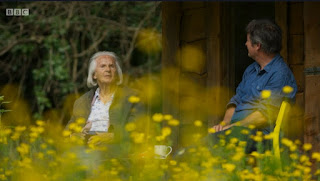
'Variety is the spice of life' according to Mammy.
He asks his Mother what his Dad would have thought of all this and she said he would be overcome by all the Bees and Bugs.
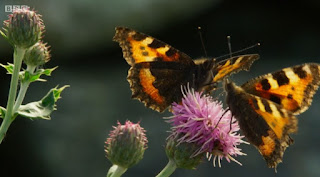
Mammy Johnson says it would not look right in a smaller household garden and Colin says it is our perception on what looks right.
Colin says its changing we are obsessed with neat gardens but Nature is not neat!
In Ireland they like things being tidy both the landscape and in their gardens this all contributes to the decline in wildlife.
Katy Bell from Ulster Wildlife Trust have a current campaign called 'Let Nature in' and this is about the important place gardens are for wildlife.

They plan to put up a camera and footprint tunnel so they can see the Hedgehogs too.
'Hedgehogs, little balls with spikes on them, with a little piggy'. Teddy Weston
She loves them and Katy says they like to get them engaged early and they will carry that on.
They set up the Hedgehog footprint tunnel by adding dye and food to a board by the exit, hoping the Hedgehog will go through it.

Katy is back the next morning to check the camera with Teddy and they transfer the memory card to a laptop so they can both see.
It starts with the local Cats coming to the food and sadly just a bird finishing off the food this morning so no hedgehogs.

So Teddy was right there are Hedgehogs visiting her garden.
Katy says gardens are so important as local habitat is being destroyed, our gardens can become a wildlife haven.

July is when the Hum starts to take over, the Summer Hum of the Bumblebees, Solitary Bess and Honeybees and anything else that can hum.
There is fluttering wings everywhere to from the Butterflies.
Colin is by the pond and the garden is feeling like a 'lush green woodland glade' which is how he wanted it to be, surrounded by trees with a green oasis full of flowers in the middle.

Next year the garden will have more variety and growing under these and the Poppies are the more interesting Native plants.
The Perennials will come up year after year but take a couple of years to establish and flower and have a more important role in the natural world as food plants.
Colin has been positioning Trail Cameras in several positions around the garden and is checking the footage.

He had no idea whilst he was sleeping in his little cabin that all this was going on outside.

This is a good way to help design a Wild Garden is to see what grows in your area.

Colin is rattling a seed head and they rattle when they are ready and this one gets its name from it, the Yellow Rattle, which is a great plant.
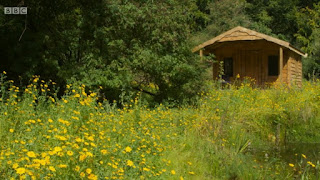
You can see why around the world people have worshipped the Sun God as it gives us life on Earth.
The Dragonflies on the pond are catching the last rays of sunshine, flying around looking for females and mating.
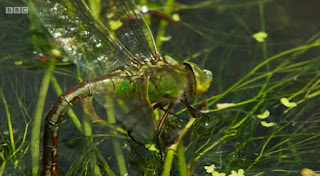
The ponds not been there long but its amazing how many insects it has attracted and a whole new set of animals it has now brought to the Garden.
This format of 4 episodes is as shown on BBC NI and may differ slightly than shown on BBC 2
All photographs are copyright of BBC.com

No comments:
Post a Comment